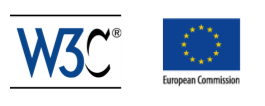
W3C Workshop, Call for Participation
Data, content and services for the Multilingual Web
29 April 2015, Riga, part of the
Riga Summit 2015
on the Multilingual Digital Single Market (27-29 April)
Important dates
| 18 Dec | Call for Participation issued |
|---|---|
| 8 Mar | Deadline for speaker proposals |
| 20 Mar | Acceptance notification sent |
| 24 Mar | Program released |
| 1 Apr | Sponsorship deadline |
| 20 Apr | Registration deadline |
| 29 Apr | Workshop 2015 |
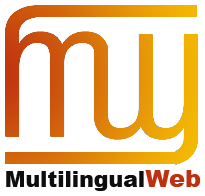
Sponsors:
Project funding
The LIDER project receives funding by the European Commission through the Seventh Framework Programme (FP7) Grant Agreement No. 610782.
Today, the World Wide Web is fundamental to communication in all walks of life. Although English once dominated the Web, other languages are increasing their presence, with long-term economic and social impacts. If the Web is to deliver its promised benefits and live up to the ideal of a single, world-wide network, it is vitally important to ensure the multilingual success of the World Wide Web.
The MultilingualWeb community develops and promotes best practices and standards related to all aspects of creating, localizing, and deploying the Web across boundaries of language. It aims to raise the visibility of existing best practices and standards for dealing with language on the Internet and on identifying and resolving gaps that keep the Internet from living up to its global potential.
The core vehicle for these actions is a series of events that started in 2010 (run by several projects: MultilingualWeb, MultilingualWeb-LT and currently the LIDER project). Following seven highly successful events in Madrid, Pisa, Limerick, Luxembourg, Dublin, Rome and Madrid again, the eighth workshop will be held in Riga. It will be supported by Tilde, and it will be part of the Riga Summit 2015 on the Multilingual Digital Single Market.
On this page: Participate • Goals, scope, audience • Venue and travel
Related links: Report • Program • About W3C
How to participate
Participation is free. We welcome participation from both speakers and non-speaking attendees.
If you are interested in attending, please register as soon as possible. The workshop will be part of Riga Summit on the Multilingual Digital Single Market. We are asking you to register via the Summit Web site and highly recommend you to attend the whole Summit!
The total number of participants will be limited, and registrations will be dealt with on a first come, first served basis. Registration may close early if the event is full. W3C membership is not required to participate in this workshop.
Presentations are typically limited to 15 minutes, however we may have a small number of longer talks during the workshop. Talks should describe standards and best practices relevant to the multilingual Web. Talks should ideally describe all of the following with relation to a given topic:
- existing best practices and/or standards that are relevant
- new standards and best practices that are currently in development
- gaps that are not covered by best practices and/or standards
The call for speaker proposal ended 8 March. If you wish to speak at the workshop, please provide a brief outline for your proposed talk at the appropriate place in that form. Based on a review of all submitted position papers, the Program Committee will select the most relevant and invite the submitters of those papers to speak at the event.
Speakers are asked to focus on describing practical ways of enabling people to meet the challenges of the multilingual Web, rather than to focus on technical details or specific products. Given the diversity of topics at the workshop, speakers should also pitch their talk at a level that will be understood by attendees who are unfamiliar with the topic area.
We are particularly interested in innovative, unusual, or first-time approaches to tackle known bottlenecks or gaps in the creation, localization, and deployment of multilingual Web content and services.
If you have any questions, please contact This email address is being protected from spambots. You need JavaScript enabled to view it. .
Goals, scope, and audience
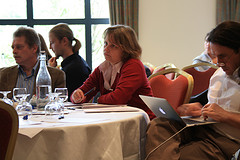
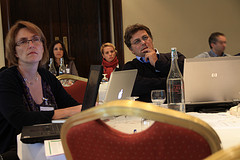
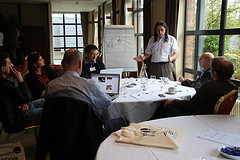
As with previous MultilingualWeb events, this workshop will bring together speakers and participants with an interest in best practices and standards aimed at helping content creators, localizers, tools developers, and others meet the challenges of the multilingual Web. A unique proposition of the workshop is that it brings together speakers and provides opportunities for networking across a wide range of communities to produce a holistic view of the problems faced in developing and deploying multilingual content and applications on the Web.
In this workshop we wish to consider a wide spectrum of issues, ranging from blogs and social networking sites, to localization of large corporate or organizational enterprises. We are particularly interested in speakers who can identify gaps in standards and best practices related to the mutilingual Web, and propose opportunities for addressing those. Through these workshops, the European Commission wishes to promote widespread adoption of novel, innovative solutions, workflows, and approaches, and stimulate discussion concerning concrete proposals for future EU-funded actions in the field of multilingual technologies.
The workshop will be part of the Riga Summit 2015 on the Multilingual Digital Single Market. We are organizing the workshop as part of the Riga Summit to strengthen the European related community at large. Depending on the number of submissions to the MultilingualWeb workshop we also may suggest to move presentations to other days of the summit. For these reasons we highly recommend you to attend the whole Riga Summit!
Topics of interest for the MultilingualWeb workshop include, but are not limited to, the following:
Developers: Browser support; Web addresses (IRIs and IDNs); Web protocols (HTTP(s), IRC, REST, etc); Content formats (HTML, CSS, SVG, etc); Scripting languages (JavaScript, PHP, etc); Unicode; Locale data formats (CLDR, etc); Language and locale tags; Data feeds…
Creators: Content management and authoring tools; Browser support; Mobile Web; Voice on the Web; Language selection and navigation; Multilingual web sites; Usability and design for i18n…
Localizers: Localization standards and tools; Optimizing localization processes, workflows and business models; TM and terminology databases; Machine translation; Crowd-sourcing; Cloud based issues; Process enablers…
Users: Social Web (blogs, social media, etc.); Cultural topics; Minority languages; Accessibility…
Machines. Semantic web; RDF and multilingual Linked Open Data / Multilingual data sets; Multilingual web services; Language resources; Text mining; Language technologies; Search engine optimization; Web architecture and processes…
Policy makers. Why the multilingual web matters; Trends; Standards organization players; Political issues…
The workshop is expected to attract a broad set of stakeholders, including managers and practitioners working in the areas of content development, design, localization, and production management; developers of tools such as translation tools, content management systems, editors, etc; researchers and developers working with language technology and resources; browser implementors; standards and industry body representatives; and many more. The interchange of information and perspectives from this diverse group is expected to provide a more thorough picture of the existing landscape for multilingualism on the Web, and was one of the successes of the previous workshops.
Become a sponsor
W3C proposes a dedicated sponsorship program for these workshops to enable organizations to showcase their business and underscore their commitment to the shared goals of the W3C. The sponsorship benefits allow workshop sponsors to reach out to all stakeholders and decision makers worldwide and to be associated with breakthrough innovations that are paving the future of the Web.
Get more information about becoming a workshop sponsor. The deadline for sponsorship submissions for the Riga workshop is 1 April, 2015.
Important Dates
See the top of this page.
Venue, hotels, and other workshop logistics
Information about the venue in Riga, on how to get to Riga, hotels and other workshop logistics will be provided shortly via the Riga Summit 2015 on the Multilingual Digital Single Market page.
Contact
- For questions about the program or the workshops in general, please contact This email address is being protected from spambots. You need JavaScript enabled to view it. .
- For assistance with local workshop logistics or technical issues, please visit the Riga Summit 2015 web site.
Deliverables
Workshop sessions and documents will be in English. After the event presentations, minutes and the workshop report will be made available to the public, linked from the MultilingualWeb site.
Co-chairs
- This email address is being protected from spambots. You need JavaScript enabled to view it. (W3C)
- This email address is being protected from spambots. You need JavaScript enabled to view it. (DFKI)
- This email address is being protected from spambots. You need JavaScript enabled to view it. (DFKI / W3C Fellow)
Program Committee
- Michael Anobile (lisa-open.org)
- Aljoscha Burchardt (DFKI)
- Manuel Tomas Carrasco (Directorate-General for Translation, European Commission)
- Claudio Chiavetta (Lionbridge Belgium)
- Philipp Cimiano (University of Bielefeld)
- Thierry Declerck (DFKI)
- David Filip (University of Limerick)
- Tatiana Gornostay (Tilde)
- Jorge Gracia (Universidad Politécnica de Madrid)
- Ivan Herman (W3C)
- Matthias Heyn (SDL)
- Richard Ishida (W3C)
- John Judge (Dublin City University)
- Kevin Koidl (TCD)
- Dave Lewis (TCD)
- José Emilio Labra Gayo (University of Oviedo)
- Christian Lieske (SAP)
- Arle Lommel (DFKI)
- Charles McCathie Nevile (Yandex)
- John McCrae (University of Bielefeld)
- Elena Montiel (Universidad Politécnica de Madrid)
- Jan Nelson (Microsoft)
- Addison Philipps (Amazon Lab126)
- Georg Rehm (DFKI / W3C Germany & Austria Office)
- Mariano Rico (Universidad Politécnica de Madrid)
- Phil Ritchie (VistaTEC)
- Felix Sasaki (DFKI / W3C Fellow)
- Jörg Schütz (bioloom group)
- Fernando Serván (Food and Agriculture Organization of the United Nations)
- Ankit K. Srivastava (Dublin City University)
- Olaf-Michael Stefanov (JIAMCATT / ASLING)
- Dennis Tan (Verisign)
- Dan Tufis (RACAI)
- Hans Uszkoreit (DFKI)
- Cristina Valdes
- Andrejs Vasiljjevs (Tilde)
- Daniel Vila-Suero (Universidad Politécnica de Madrid)




